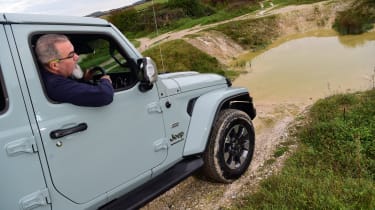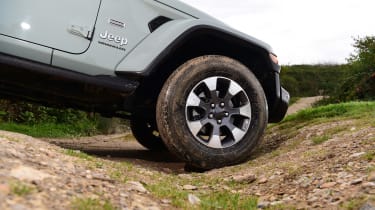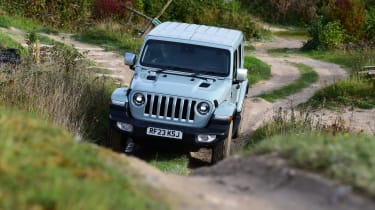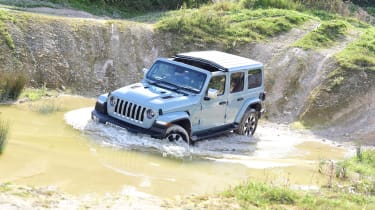Off-road driving tips: how to make the most of your 4x4
There’s great fun to be had taking a 4x4 off road, but our advice here can help you in everyday driving, too
If you’ve bought an SUV – especially one with four-wheel drive and dedicated off-road settings – there’s every chance you’ll want to see exactly what it can do in the rough. Well, Auto Express is here to help, as we head into the dirt with a Jeep Wrangler to give you top tips and advice for any potential off-road adventures.
The best way to make the most of your car’s ability will be to take it on a properly prepared course, although do make sure that you’re insured for such driving beforehand. If you want to use the public highway for so-called ‘green laning’, then you need to find unclassified roads (UCRs) or byways open to all traffic (BOATs).
The easiest way of doing this is to sign up to the Green Lane Association (glass-uk.org), which offers advice on where you can head off road legally, while becoming a paid-up member gives you access to TrailWise2, the GLA’s constantly-updated online database of every vehicle-accessible off-road route that the association currently knows of in the UK.
The biggest piece of advice that anybody can give to prospective off-roaders is to be prepared. Here we take a look at some of the things that you need to be aware of, including how to get yourself and your car ready for an off-road drive, the dos and don’ts of driving on the trail, and even what you need to do before heading back on the highway.
The drive may well offer a bumpy ride, but our off-road driving top tips here should help any journey go smoothly.
Attend a training course
Even if you’ve bought the most advanced off-roader, you’re not going to be able to make the most of it if you just head for the nearest muddy field and let rip.
The best piece of planning you can do is to take an off-road driving course, where a qualified instructor will be able to show you the ins and outs of off-road driving. Expect to pay around £150 for one-on-one tuition, or more if you want to learn about advanced techniques. Plus you’ll usually be at the wheel of a centre’s own 4x4 to save your car from damage.
Check your car’s capability
Vehicles such as the Jeep Wrangler have their off-road capability clearly marked – in this case it’s on a plaque on the rear tailgate. If it’s not easily to hand, then you’ll need to look at the owner’s manual. Here you should find the data you need, plus instructions on how and when to use the car’s 4x4 system.
Apply some pressure
Most 4x4s drive out of the showroom on tyres that are biased towards road use, rather than off-roading. Tyre pressures for the road are designed to offer good fuel economy when rolling across smooth tarmac, but if you want to head off road, taking some air out of the tyres will help with traction on slippery surfaces and reduce the risk of you getting stuck.
If you’re bitten by the bug of off-road driving, then the next step is to invest in a set of all-terrain tyres for your 4x4. These are compromised on the road – most notably by producing more tyre roar – but they deliver far better grip in slippery conditions.
They can benefit from lower tyre pressures, too, but whichever type of tyre you’re using, always be sure to reinflate them to their recommended on-road settings before heading back onto the highway.
Angles of attack
A car’s approach, departure and breakover angles determine how far off road you can go. Basically these figures tell you how much clearance you have when tackling steep slopes before the car’s bumpers or the underside will touch the ground. The higher the figure (in degrees), the more clearance a car will have.
Make the most of your tech
Most modern 4x4s come with comprehensive touchscreens that will show you information about your car’s settings. In the Jeep, the locking differentials are operated via the screen, while other displays show steering and vehicle angles.
Use the lowest gear available
Low-range gears help 4x4s tackle tough terrain by making better use of the power at lower revs. Our Jeep uses a lever to select low range. If yours doesn’t have low range, use first or second gears instead.
Watch your thumbs
You should find a comfortable driving position that allows you to see all of your surroundings before you head off, but one common mistake when driving off-road is to grip the steering wheel with your thumbs inside the spokes. Because the surface you’re driving on is potentially strewn with rocks and other obstructions, a front tyre could strike a solid object and cause the steering to kick back through the wheel, moving it suddenly out of your hands.
With your thumbs in the way, there’s a risk of a sprain or even a more severe injury, so it’s best to grip the wheel with your palm and fingers on the outside of the rim.
Look before you leap
You should be able to move around in your seat to look ahead from different positions, although before you do this, get out and check the route ahead – don’t just drive blindly forwards.
Use a spotter
On sections where you can’t see what’s ahead, a spotter outside the car can guide you. It’s worth saying here that you should never head off-road alone, and always tell somebody where you’re going.
Power up
When tackling a steep uphill section, it’s best to gather as much momentum as possible before you hit the upward slope. Accelerate before you get there, and you should be able to make it to the top without stopping. Low-range gears and differential locks are your friends here, with the ability to send power to all four wheels at once, which should overcome any loss of traction.
If you’re driving an unknown route, stop when you reach the peak, so that you can assess what’s coming next.
Slow down
Low-range gears are your friend on downward slopes, too. Select as low a gear as possible and let the engine braking do most of the work, letting the revs rise in the process – using the brakes could cause a lock-up, even when ABS is fitted, because dirt can build like a wave in front of the tyres, reducing grip. If your 4x4 has hill descent control, use it – the car’s electronics will regulate your speed.
Don’t make waves
First, check the depth of the water you want to cross and find your car’s wading depth in the owner’s manual. Once you’re sure it’s safe to cross, go slow and steady. A splash looks spectacular, but get water in the engine or electrics, and it’s a costly mistake.
Steady sailing
If you haven’t worked it out by now, the mantra for most off-roading is to take it easy. This is especially true when traversing at an angle. Keeping your speed down helps with grip and stability.
Keep it clean
A good sign of off-road fun is a filthy car. But wash off excess dirt before heading home, so that you don’t leave slippery mud and stones on the highway, causing a hazard to other road users.
Now learn more by clicking the links below...
Find a car with the experts









